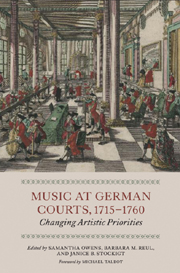Book contents
- Frontmatter
- Contents
- List of Tables
- Foreword
- Preface
- Editorial Notes
- Notes on Contributors
- List of Abbreviations
- 1 ‘Das gantze Corpus derer musicirenden Personen’: An Introduction to German Hofkapellen
- KINGDOMS AND ELECTORATES
- DUCHIES
- PRINCIPALITIES AND PRINCE-BISHOPRICS
- 9 The Court of Anhalt-Zerbst
- 10 The Court of Sondershausen
- 11 The Court of Würzburg
- LANDGRAVIATES AND MARGRAVIATES
- Index
10 - The Court of Sondershausen
from PRINCIPALITIES AND PRINCE-BISHOPRICS
Published online by Cambridge University Press: 12 September 2012
- Frontmatter
- Contents
- List of Tables
- Foreword
- Preface
- Editorial Notes
- Notes on Contributors
- List of Abbreviations
- 1 ‘Das gantze Corpus derer musicirenden Personen’: An Introduction to German Hofkapellen
- KINGDOMS AND ELECTORATES
- DUCHIES
- PRINCIPALITIES AND PRINCE-BISHOPRICS
- 9 The Court of Anhalt-Zerbst
- 10 The Court of Sondershausen
- 11 The Court of Würzburg
- LANDGRAVIATES AND MARGRAVIATES
- Index
Summary
WHILE THE SONDERSHAUSEN HOFKAPELLE undoubtedly counts among the smaller court orchestras of central Germany, it was nevertheless an ensemble that could call upon a long tradition – one that continues to the present day. Yet tracing the Kapelle's early history up until the second half of the eighteenth century is at times problematic. Not only does the information provided by the extant primary sources vary widely in terms of its quality and comprehensiveness, but documentation is extremely sparse for the first half of the eighteenth century. Virtually no archival material exists to document the appointments and activities of individual musicians, shed light on the musical life of the residence, or indeed provide a general understanding of cultural representation at the court.
Only the ‘Rentereirechnungen’ (treasury accounts) have survived intact, although unfortunately without the corresponding volumes of receipts. While these accounts provide continuous insight into the life of the court, it is impossible to draw conclusions regarding expenditure from the count's (and later the prince's) privy purse. In contrast to the rather sketchy archival documentation, the extant musical scores associated with the Hofkapelle are virtually unparallelled in terms of their variety within a central German context. The remnants of the court's music library – today stored partly in the Schloßmuseum Sondershausen and partly at the Thüringisches Staatsarchiv Rudolstadt – comprises representative portions of the performance material used by the Hofkapelle from around 1700.
- Type
- Chapter
- Information
- Music at German Courts, 1715–1760Changing Artistic Priorities, pp. 287 - 304Publisher: Boydell & BrewerPrint publication year: 2011



